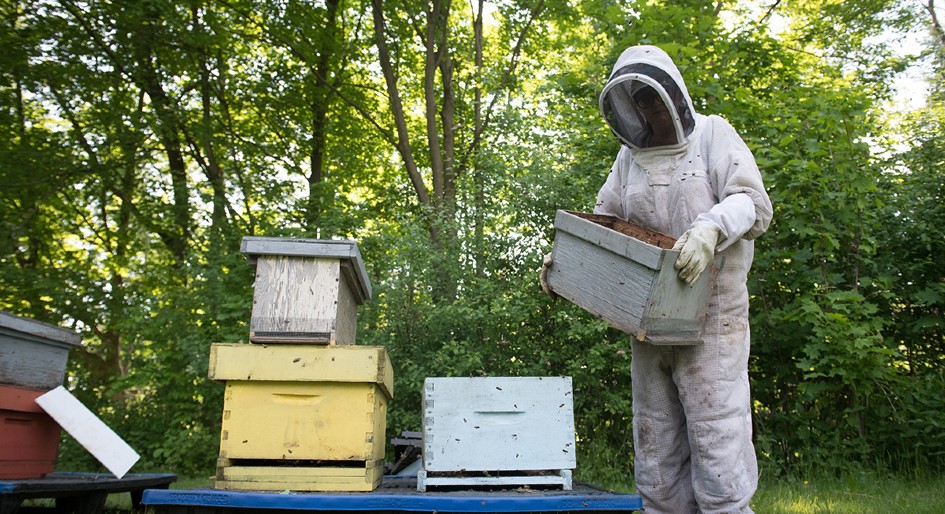Sunnybrook Hospital has become the first healthcare facility in Toronto, and quite possibly Canada, to welcome honeybees to its property.
Thirty thousand honey bees in three hives are now located on the Bayview campus, about one kilometre away from the main hospital buildings. The goal is to support this declining pollinator population, as well as provide in-person educational sessions for staff and visitors to learn more about the bees.
“Besides providing an opportunity to learn more about the fascinating inner workings of a bee colony, and a connection to nature in the city, we think the bees will provide a great way to connect with employees and the community about broader environmental issues, and ideally spur additional sustainability initiatives,” says Michael Lithgow, manager, energy and climate action at Sunnybrook.
As it stands, a few hospitals in the U.S. host hives. Local non-hospital sites include the University of Toronto, the Royal York Hotel, rooftops of several shopping malls and some mixed-use residential properties. Toronto became Canada’s first official “Bee City” in 2016. As Lithgow adds, cities are often ideal locations for beekeeping due to abundant flowering plants, fewer pesticides than rural areas and many sources of water.
Set on a 100-acre property, home to 4600 trees and extensive gardens, Sunnybrook offers such a habitat. It is also managed on low-impact principles, including minimizing water use, pesticides and waste.
“The bees are a natural and interesting addition to the landscape,” says Lithgow. “In the early planning stages of the project, it rapidly became apparent this would be a great way to engage staff and the public on a far-reaching sustainability issue. Almost everyone we engaged with expressed an appreciation for bees and other pollinators.”
It took just over a year to bring the hives to the campus with help from internal and external stakeholders, although the thought started percolating among residents in the Veterans Centre a few years ago. Genny Ng, performance improvement specialist at Sunnybrook, jump-started the idea of partnering with local beekeepers.
“As an organization with so much green space, our staff enjoy walking around the property and eating outside for their breaks,” says Ng. “We have a wonderful team that maintains our flower and vegetable gardens for staff to enjoy, bringing bees to the property will enhance these gardens and support a greener community.”
The pandemic is putting even more strain on the physical and mental health of Canadians, according to Robin Edger, executive director and CEO of The Canadian Association of Physicians for the Environment. He says “nature offers a prescription” of sorts, as there is “a growing body of evidence indicating that spending time outside in nature is one of the best things we can do for our well being.”
“Bees make excellent ambassadors for wellness and environmental health,” adds Lithgow. “We understand how important they are for our food and plants, while we’ve also heard how so many pollinators are threatened by pollution, disease and climate change.”
The three hives are expected to produce about 100 to 150 pounds of honey each year. At no direct cost to the hospital, a modest revenue is expected. Once the hives are established, honey will be available for purchase in the Sunnybrook gift shop and at the vendor tables through Fairhaven Farm—the beekeeper who is managing the hives in exchange for space. As the bee colonies grow, plans call for adding more hives if and when appropriate.
Photo by Kevin Van Paassen






